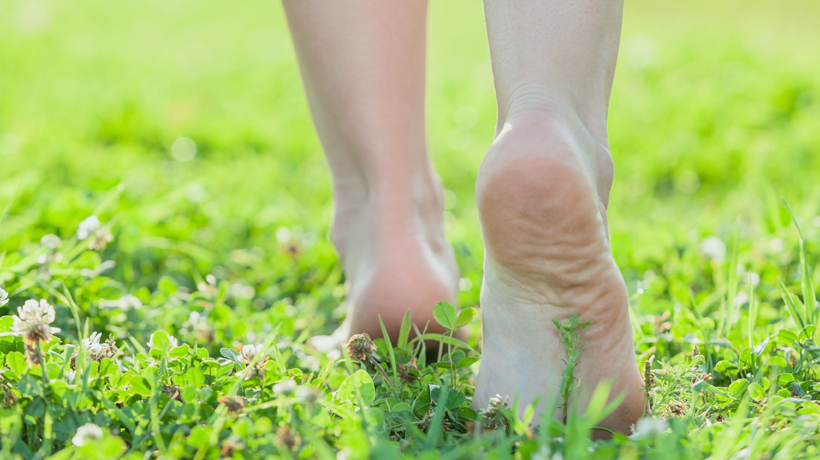Even if you’ve traded your stilettos for some sensible flats, you might still be depriving your feet of some potential health benefits. Some people are shedding their shoes in a movement called “earthing” or “grounding.” Alternative health practitioners suggest walking barefoot for a few minutes each day can affect the health of more than just your feet.
We looked at the potential effects of grounding as well as the direct consequences on your feet and ankles.
Prevents or provokes injuries?
An Ithaca College press release explored walking barefoot, citing expertise from Patrick McKeon PhD, ATC, CSCS, an athletic trainer at Ithaca College. The press release says there are tiny muscles in the feet that play a vital but underappreciated role in movement and stability. Their role is similar to that of the core muscles in the abdomen.
Years of putting feet into shoes means we don’t always develop these muscles. By spending several minutes a day without shoes, we can improve balance, body awareness, range of motion, and strength in the feet and ankles. We can even improve our larger leg muscles and lower back region by improving our balance.
However, experts don’t recommend throwing away all your shoes at once. Developing those muscles takes time, and without appropriate strength in the foot, there’s a high risk of poor walking technique and increasing the risk of injury. Experts recommend starting with walking around indoors or just a few minutes outside at a time until you’re comfortable. Talk to your doctor about the specific support you may need for your feet, like insoles for your arches.
Moreover, as the medical website Healthline explains, without additional padding from shoes, you are susceptible to injury from the terrain (like rough or wet surfaces or issues with temperature or sharp objects on the ground). There is also a risk for exposure to harmful bacteria.
Other health claims
Most generally consider earthing a form of alternative medicine, since most traditional health resources haven’t covered this movement. However, in the past few years, more research suggests there may be more benefits.
The idea of earthing is that the Earth’s surface has free or mobile electrons. The human body can absorb electrical charges from the earth since the skin acts like a conductor.
A 2012 issue of the Journal of Environment and Public Health published a review called “Earthing: Health Implications of Reconnecting the Human Body to the Earth’s Surface Electrons.” Researchers reviewed evidence from a number of studies that suggested that standing or walking barefoot on soil, grass, or earth showed an improvement in chronic stress, pain, insomnia, and inflammation. A 2015 study in the Journal of Inflammation Research echoed some of these claims.
“Our main hypothesis is that connecting the body to the Earth enables free electrons from the Earth’s surface to spread over and into the body, where they can have antioxidant effects,” the study says. “Specifically, we suggest that mobile electrons create an antioxidant microenvironment around the injury repair field… If verified, these concepts may help us better understand and research the inflammatory response and wound healing, and develop new information on how the immune system functions in health and disease.”
Scientists say suggest we need more research in this area. But when the weather is right, if you feel compelled to kick off your shoes, we say there’s nothing wrong with spreading your toes out every now and then.
Sources:
https://www.ithaca.edu/ic-news/releases/going-barefoot:-strong-foot-core-could-prevent-plantar-fasciitis,-shin-splints,-and-other-common-injuries-40536/#.VkzSVnarQdV
https://www.healthline.com/health/walking-barefoot#potential-dangers
https://www.ncbi.nlm.nih.gov/pmc/articles/PMC3265077/
https://www.ncbi.nlm.nih.gov/pmc/articles/PMC4378297/



